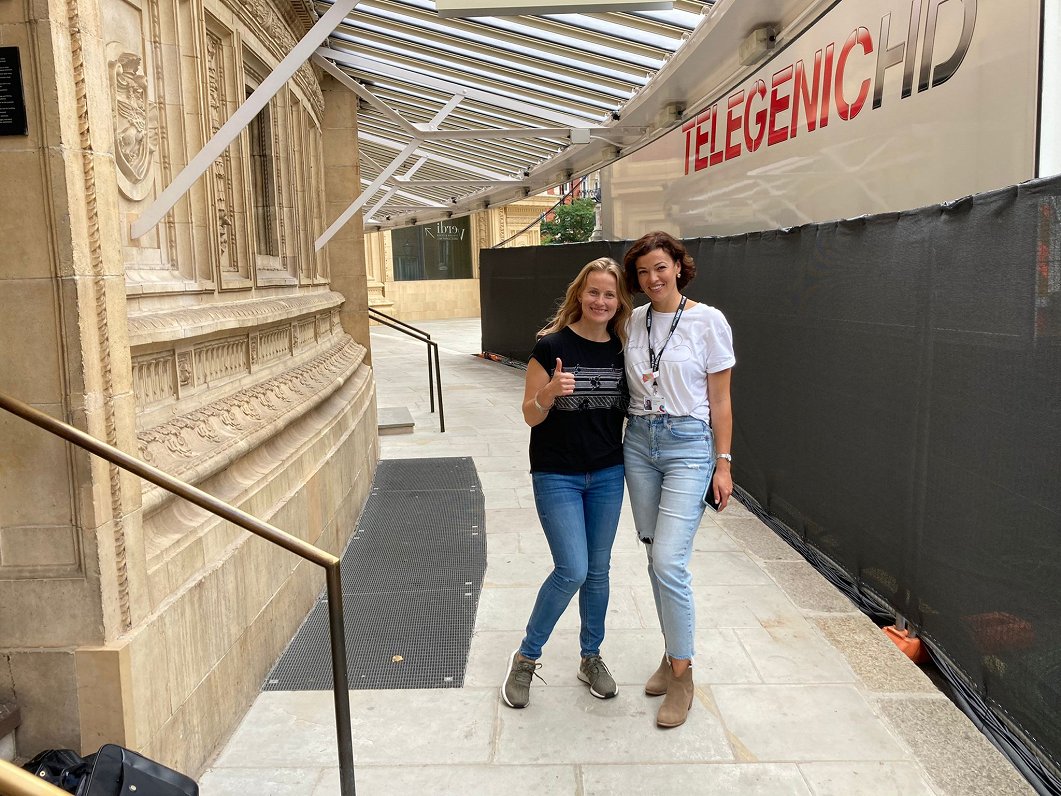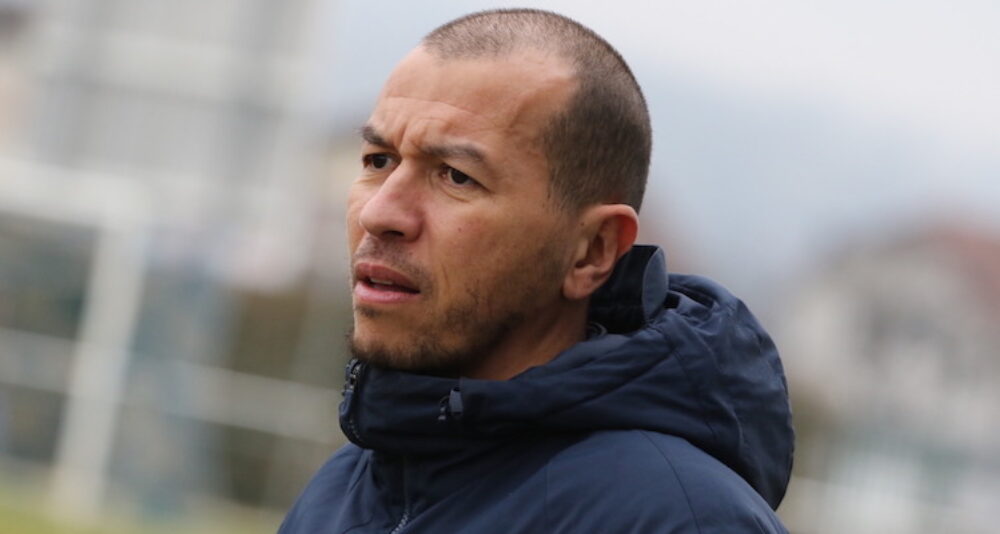On the evening of September 11, the closing concert of the festival “BBC Promenade” was performed in the Royal Albert Hall in London, which could be enjoyed live by the listeners of Latvian Radio 3 – “Klasika”. Our accordionist Ksenia Sidorova also performed at the concert with tenor Stewart Skelton, the choir “BBC Singers” and the BBC Symphony Orchestra, and she is the first accordionist in the history of “BBC Promenade” to take the stage as a soloist!
The charismatic maestro Sakari Oramo joined the conductor’s stand, but the program included music by Gitia Razaza, Malcolm Arnold, Samuel Barber, Astor Piacola, Gustav Mahler, Frederic Dielius and Richard Wagner.
Signe Lagzdiņa, the program manager of “Klasika”, enjoyed the concert in person, interrogating Ksenija Sidorova in the meantime about the upcoming concert – “BBC Proms Last Night”, about Ksenija’s busy and concert-intensive September, future plans, ideas and dreams, as well as management and its replacement .
Signe Lagzdiņa: You with “BBC Proms“have a good relationship. Last year, when nothing happened, you had “BBC Proms Royal Albert Hall” room concert – players from home. And now you say that whenever you are in the Royal Albert Hall, you play Piacola’s music.
Ksenija Sidorova: Yes, it will be again this time, because Pjacolla is a century old – we musicians all over the world are celebrating it, and here we will be doing it in very good company – with the BBC symphony orchestra and maestro Sakari Oramo. Of course, we will also play other compositions, but everything will be around the theme of tango. This year, the concert organizers came up with it, and I liked it too, because my latest album, released in February, is full of Piacola music. Although there are other composers – Frank Angelis, for example. I was at peace with the subject they suggested.
So the repertoire was offered “BBC Proms”. Can you tell a non-anointed listener in an active concert life how you understand what is “BBC Proms Last Night“?
It’s like a deal concert, where orchestras, soloists, conductors meet – and just celebrate it all. Of course, the mood of the concert is gorgeous.
I was told yesterday – do you understand that you will be the first accordionist in the history of this festival to perform in such a concert? I say – yes, there is a “little” on my shoulders. (laughs)
This concert has a history of 126 years, there were no accordionists in it, so I have the great privilege of being here – I was very well received here by the orchestra and conductor, management – everyone around me, and I have returned to London: I came here in 2004 or 2005. year – then in the family where I live, I turned on the television, and it was this concert – I watched and could not imagine that one day I will perform there …
I have heard that the audience in this concert is much freer than in other concerts.
I am an accordionist and have performed on various stages – so I am ready for any situation.
I remember how we worked with my first teacher from Riga 1st Music School – she unfortunately recently passed away. But back then we had a very small class, followed by another room, and when we had an hour, people walked through our class. It was a big minus, but also a plus, because I learned to disconnect from everything that was going on around me and be just in music. So everything that happens is positive.
Thinking of Piacoll – he’s hardly been to the Royal Albert Hall?
A good question should be checked. There is a lot of information. Yesterday I asked if it was really the case that I was the first accordionist in the history of this festival, but his music is 100% played here. I also played his music myself, but I can’t say if he himself has been here …
But let’s conjure a fairy tale! What do you think – what would he say, what would he think, how would he behave?
He once came to Paris to study with Nadia Boulevard. And she decided to give her all her classical scores, all the notes.
When she saw these scores in Boulange, she said, “It’s not you! What is what you’re doing? Show me it!” He thought he had nothing to lose, brought his bandoneon, and it was then that she discovered the voice we hear today.
I think he was an innovator and [arī tagad] would be ready for everything – both to play right on the street, at the Royal Albert Hall, and in the concert hall itself. It seems to me that personalities of this scale can do anything.
But please tell me what the story you told at the house concert I mentioned – if you don’t play Piacola on stage in the Albert Hall, then at least on stage.
I remember when we played in the Royal Albert Hall for the first time with my friend, guitarist Milos Karadaglich, there were a lot of TV cameras in the concert, everything happened around, and then I somehow came into this hall with Piazzolla’s music. Now I am glad that I will play something written for me in the concert – it is a composition by the French composer Frank Angelelis, written for accordion. It also inspires me to work further. That’s not just Pjacolla. Because an accordion can really play a wide variety of music – we have a very wide range of things to do. Of course, it’s a true story that I played Piacollu too beksteidžā with his friends, always playing with Avi Avitala before performing on stage.
Behind the orchestra, choir and conducted all Communications Oramo. Have you already collaborated?
No, this is the first time.
An orchestra of that level – how they accepted me in rehearsal … I had a feeling, or have I really earned it, that they were talking to me, that they could hear me.
It was a collaboration between the three of us – Communication Oramo and the orchestra, and if people are already at the same level as this orchestra, they can collaborate with anyone – they are so polite … And not just because they are English, but because that they are professionals and really everything sounds wonderful. It will be wonderful to share the stage with them.
“BBC Promenade” closing concert rehearsal
Photo: Signe Lagzdiņa
–
–
I looked at your calendar on the home page and saw that September has returned to you in the same range as before the pandemic. Can you share a little, what are your plans for the future?
Man [šāds virpulis] the last time was not just before the pandemic, but before my daughter was born, because she is now two years and three months old, and I really hadn’t embarked on more extensive concert tours until now.
When she was two months old, I started playing in concerts, but they were separate concerts. Now that I’m gone for weeks, there’s another thing. Of course, now everything has changed, she goes to kindergarten. Half the time I sit on the phone, but I am inspired by both his and my life on stage, so I am very happy that this time I will go to Italy right after the London concert, I will have three concerts with the French cellist Camilla Tom (Camille thomas). Then there will be Amsterdam’s “Concertgebouw” – a solo concert with “Camerata RCO”, then Bucharest, Enescu Festival, but I will end the month again in Italy, at the birthplace of the accordion, Castelfidardo and Valmontone, in two cities we will play a new program – “Goldberg Variations” for two accordions Pjetro Rofi (Pietro Roffi). He is an accordionist with whom I started working during a pandemic, we had a productive job – now we will do tours together.
Then there will be the next album?
I do not know. I have a lot of ideas for the next album, I don’t know who will be in the first place when thinking about the disc. I don’t think about it yet – I wondered how I should survive this September. (laughs) Lots of new programs.
But in life it tends to be – either nothing or all too much.
You can’t want everything to be perfect! But I’m glad it is now.

Signe Lagzdiņa and Ksenija Sidorova at the Royal Albert Hall in London
–
–
Remember – when we called during the pandemic, you weren’t too happy about your management lokdauna at the time did not support as they would have liked. Although before that you were very happy about working with HarrisonParrott. Tell me, how are you doing now?
During the pandemic, probably no concert agency and management agency was sweet, everyone was tormented and did not know how to continue living and how to earn money. I wasn’t complaining at the time that they didn’t provide me with a job – I knew no one had a job. It was hard for everyone at the time, and we are still in a very good relationship, but – I have now changed management, and my new manager is at the same time my previous manager: it turned out that we, HarisonParrot [mākslinieki], we had become like a family and we all decided to go to her in time –
our manager Tugce Tez has opened his agency – I chose to go with him because I just feel protected. Cooperation with the manager is a long-term work, and I really wanted it to develop further.
Of course, this is very important, because not only can the manager blindly put up concerts, but he has to feel what you want.
We are in contact every day – I started working with the new management two days ago …
And what do you mainly expect in the future?
I have my little islands I dream of.
There are places and orchestras that I would like to work with. Then we have both longer-term and closer plans. Everything in life is basically planned. We don’t know exactly how something will happen, but we have done our job and continue to work to make it happen.
Do you also feel a helping hand in overcoming the formalities and problems associated with Covid-19 containment measures?
Management has a lot more work to do – especially for people who coordinate flights.
While I was in the process of changing management, I had to buy airline tickets, and I didn’t lie – I spent three days in a row on the phone. Really, I tried to buy a ticket for my accordion for 12 hours!
It wasn’t easy before and now with kovidu has become a hundred times worse. Wouldn’t want to be a manager instead. I very much hope that in time it will be easier – we will have to live with the virus, we will have to learn to live, because we cannot stop and do it again. lokdaunu.
We talked about whether lokdauna time was an inspiration … But some people did not have bread on the table, and this is the worst – we have to live somehow. It’s not the hardest thing you’ve ever experienced, but we’ll make it.
–

/cloudfront-us-east-1.images.arcpublishing.com/eluniverso/VKMBACFHTRHBVOYLJKVCILCDDM.jpg)
